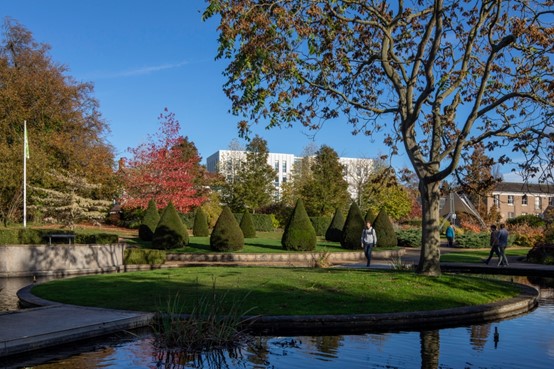
After two years of virtual-only meetings owing to the pandemic, on Friday 27 May 2022, the European Copyright Society (ECS) will gather in-person in Nottingham to discuss the constitutional turn and evolution of copyright law over the past few years, highlighting its influences from and interrelation with human rights law and related aspects such as competition and fairness concerns. The conference’s host and ECS President, Prof. Estelle Derclaye, will welcome Lord Justice Arnold of the Court of Appeal of England and Wales as keynote speaker, while numerous leading voices from the academic community with IP law expertise will be brought together and contribute to the discussion.
Copyright law in the European Union and beyond rewards authors by offering them a very long term of protection for their original works, which lasts over the course of their lifetime and 70 additional years. According to article 17(2) of the EU Fundamental Rights Charter, the property right conferred by copyright law is a creator’s fundamental right. However, a balancing exercise among other fundamental human rights and the current EU copyright framework is necessary, for the benefit of the society. Freedom of expression and associated exceptions and limitations on research and education are of utmost importance for the promotion of knowledge – how do we balance the copyright holder’s rights and these competing interests?
On the other hand, copyright challenges posed by our technology-dominated society have arguably pushed for the strict interpretation of exceptions, thereby limiting the scope of user rights. As a result, emphasis in the current framework is placed on maintaining strong copyright protections, providing copyright holders with leeway to enjoy extensive exclusive rights, limited only in specific circumstances. Arguably, the effectiveness of using the fundamental human rights framework to balance out the EU copyright protections is, therefore, questionable.
Nevertheless, enforcing those extensive exclusive rights in the online environment can be a challenge. Intermediaries, the state and other parties play a key role in carrying out the balancing exercise of enforcement and ensuring that in doing so, fundamental rights are safeguarded. Things may be even more complicated when dealing with algorithmic environments, as the implementation of fundamental human rights’ protection can be dictated by de facto standards. Striking this balance and promoting human creativity, particularly in relation to works born with the assistance of AI technology, may therefore be possible with the adoption of some alternative approach, inspired by other areas of EU copyright law.
This conference’s 5 stellar panels, comprised of 18 IP academics across Europe, will explore some of those issues, including Prof. Séverine Dusollier, Prof. Christophe Geiger, Prof. Jonathan Griffiths, Dr. Martin Husovec, Dr. Bernd Justin Jütte, Prof. Martin Kretschmer, Prof. Péter Mezei, Prof. Marco Ricolfi, Prof. Thomas Riis, Prof. Ole-Andreas Rognstad, Prof. Martin Senftleben, Dr. Caterina Sganga, and Prof. Tatiana Synodinou.
A postgraduate studies and career session will also be held, providing undergraduate and postgraduate students with an excellent opportunity to discover opportunities for postgraduate studies and career opportunities in various EU Member States, and discuss their research with the ECS members.
The ECS Annual Conference 2022 will take place in Nottingham on Friday 27 May 2022 and is hosted by the University of Nottingham Commercial Law Centre (UNCLC). Registration is now open. The conference’s full programme and information on planning your visit in Nottingham can be accessed here.
For general enquiries, contact the ECS conference’s assistant/ organiser, Miss Ioanna Lapatoura (ioanna.lapatoura1@nottingham.ac.uk).
For information regarding the scientific programme, contact the ECS President, Prof. Estelle Derclaye (Estelle.Derclaye@nottingham.ac.uk).
________________________
To make sure you do not miss out on regular updates from the Kluwer Copyright Blog, please subscribe here.


